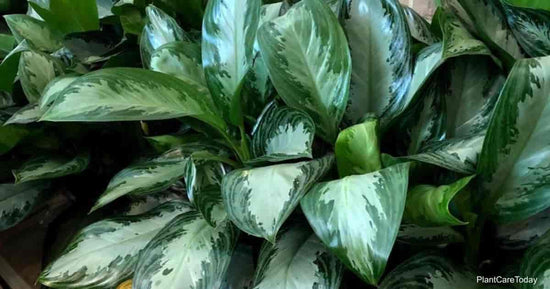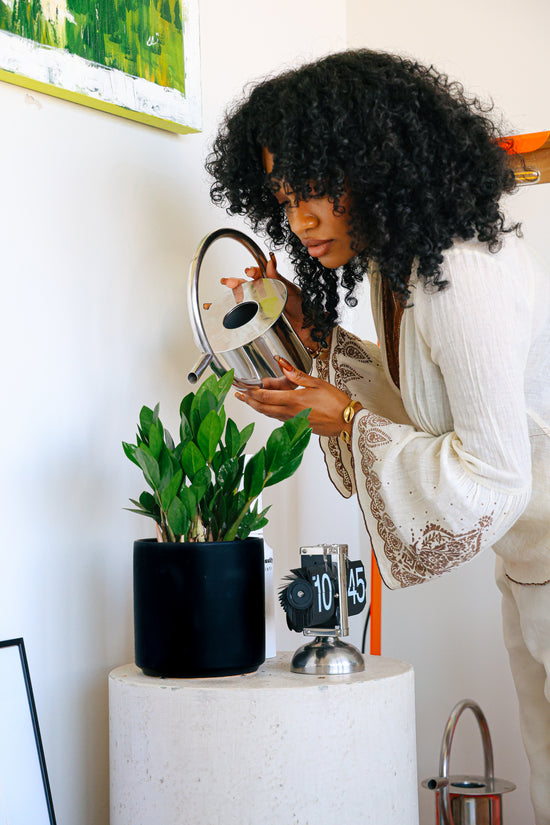The Philodendron Cordatum is a stunning plant that requires regular care. From tropical areas like Brazil, these plants can tolerate a range of light levels and will climb or trail fairly quickly under proper care.
Maintenance: Easy | Climate: Warm + Humid | Light: Bright + Indirect | Watering: Consistent | Pet Safe: No
CHARACTERISTICS
The Philodendron Cordatum grows long vines with heart-shaped leaves. The Cordatum flaunts leaves in a uniform, dark green hue. Leaf size ranges from petite to quite large, depending on lighting and nutrients. Their vines grow aerial roots, which are above the soil and help them climb when given support.
LIGHT
While the Philodendron Cordatum is adaptable to lower light levels, they will thrive under bright and indirect light. Place them a few feet away from or in a room with a South, West, or East-facing window.
WATER
The Cordatum requires slightly moist soil and should be watered when the top 2-3 inches have dried. They’re forgiving of mild mistakes and will do best with a consistent routine. Reduce frequency during fall and winter.
AIR
Create a tropical environment by maintaining warm temperatures and offering your Philodendron an extra boost of humidity. It should be kept away from drafts and cold.
Boost humidity in its environment through:
- Misting 3-5x per week
- Adding a humidifier nearby
- Placing a pebble tray underneath the pot
- Keeping it in a bathroom or kitchen with proper lighting
PLACEMENT
The Philodendron Cordatum is a symbol of health and abundance. This fast-growing plant is a powerhouse in nature, quickly growing up canopies in the rainforest and long vines in our homes. While meeting its environmental needs, consider also placing it in your bedroom, kitchen, or wherever you make space for movement and meditation to channel this intention.
POTTING & SOIL
Depending on how fast your Philodendron Cordatum grows, it can go 1-3 years without needing to be repotted into a larger pot size. They will benefit from a soil refresh each growing season, though.
A ceramic planter with a drainage hole is ideal for maintaining moisture balance for the Philodendron. Additionally, well-draining soil with amendments such as perlite, peat moss, or coco coir will make the Cordatum very happy.
SEASONAL CARE
Reduce the watering frequency through Fall and Winter while the plant rests and the soil dries slower. If they’re on a windowsill, they may need to be moved a few feet away to avoid cold drafts.
At the start of Spring, gradually increase your watering frequency again and fertilize every 2-3 weeks. Do not fertilize for at least 6 weeks after it has been repotted.
PRUNING & PROPAGATION
When the Philodendron is fast-growing, it can be pruned a few times a year. To prune a Philodendron stem, use a clean pair of scissors or shears to cut right below a node.
Stem cuttings can be propagated when they are healthy, at least a few inches long, and contain healthy leaves. Place the cutting into a glass of clean, room temperature water and be sure that no leaves are submerged. Rotate clean water weekly and transport into soil when roots have grown 3+ inches.
COMMON ISSUES
These plants are pretty forgiving, though they are capable of running into some issues. Nothing a little troubleshooting and TLC can’t fix. Always start by removing damaged leaves or stems and assessing your care routine in comparison to the needs of the plant.
BROWN LEAVES
Brown leaves or spots on a Philodendron can be a result of underwatering, lack of humidity, lighting that is too harsh, water quality, and/or drafts.
YELLOW LEAVES
Yellow leaves on a Philodendron Cordatum are most commonly from overwatering. You might also see this when it has experienced shock from temperature change, being transported, or poor lighting.
LIMP LEAVES
Leaves will go limp in response to underwatering, root rot, pest or fungus infestation, cold temperatures, lack of nutrients, and/or from being root-bound.
—--
Still have questions on caring for your Philodendron Cordatum? All Grounded Customers have access to free care consultations with our in-house Plant Specialist. Schedule a 1-on-1 Office Hours call with us so we can get your plant back to health!





